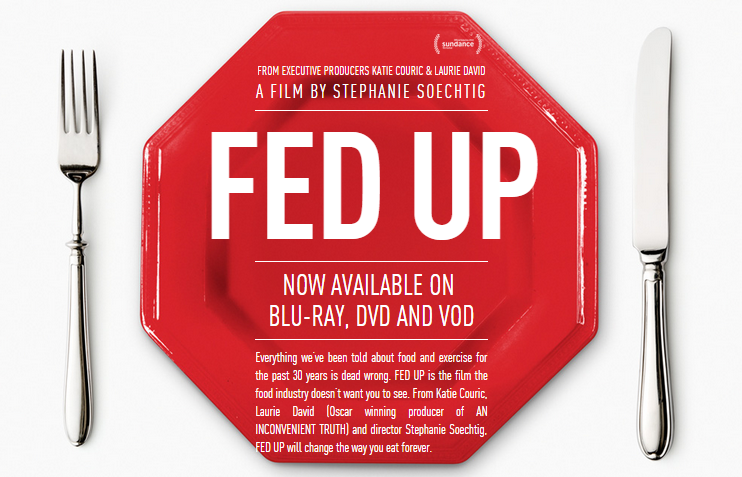Last updated on January 22nd, 2019 at 02:08 pm
Fitness dreams and food choices go hand in hand. There is not one conversation about fitness that I’ve had with friends, family or clients that hadn’t eventually turned to “What do you eat?”. That’s why I have to share my take on the movie Fed Up.
I’ve been waiting for the Fed Up movie to be available for streaming and finally had a chance to watch it this week. I love documentaries in general but find food documentaries fascinating.
I can’t say that “Fed Up” fits the bill.
The Fed Up movie starts out feeling like it’s got a lot to say. It feels like a documentary, acts like a documentary but stops short on realizing a solution.
Katie Couric is the voice throughout this advocacy documentary focusing on the issues of childhood obesity in America. There are lots of familiar faces in the film that takes a spotlight and shines it directly on the most evil thing in our diets today.
Sugar.
Apparently sugar is the core cause of everything wrong with our food and is the true key to obesity in youth. Heart wrenching statements help prove a point and are a tool to deliver a message to the audience.
I start to have a hard time when twisting the information only confuses the conversation more.
Eat less and exercise more is the wrong solution.
This statement had me sitting on the edge of my seat and saying out loud “Seriously?”
The concept that “calories in vs. calories out”, or the practice of “energy balance” is touted as the wrong solution. Stating a “calorie is not a calorie” makes me want to scream.
The point the film eventually brought this conversation around to the message that not all calories are created equal as far as the value they bring to our health. Well sure, especially when you use the two food examples from the film to compare: Raw almonds vs. Soda.
I love a good visual message, and the graphics in this movie are very well done. But getting to that visual without confusing the issue of what a calorie is would have made that message clear enough.
Food choices are at the heart of any weight issue, barring other medical concerns. When the moms were asked about how they were helping support their kid’s healthy food choices, one mentioned keeping Lean Hot Pockets available instead of the regular Hot Pockets. I almost cried.
Preparing food at home is cheaper than fast food.
I have seen this conversation in a few food documentaries and there is never enough conversation around the solution.
For those of us with access to food preparation tools, space to prepare it and time to plan and make from scratch, making our meals at home is the solution. Not everyone has access to all these elements.
Yes, the evening dinner for a family of four from a culture of “value meals” is a great deal. Re-creating the same experience at home would be much more expensive when starting from absolute scratch.
We can assume that there is a pantry with oil and spices, that everyone has the pots and pans ready for cooking. Having the simple necessities and skills to prep food from scratch is a much bigger solution. One I’m all for supporting.
Unfortunately comparing a chicken and vegetable dinner to a fast food dinner just scratches the surface.
Type 2 diabetes in adolescents is purely due to sugar intake.
Pulling these two stats and putting them together is a shocker:
- Cases of Type 2 Diabetes among adolescents in 1980: 0
- Cases of Type 2 Diabetes among adolescents in 2010: 57,638
Sugar is everywhere, in everything and stating it is the number one culprit of this statistic is hard to swallow. Again the Fed Up movie attempts to simplify a much bigger issue. It’s a serious issue we should be resolving, but focusing on just sugar won’t get us there.
There is no doubt that the fat-free, low fat focus of “diet” food options had a sugar side effect. Taking out the fat meant putting sugar back in to compensate. We are biologically tuned to enjoying sweetness in our food and this wave of fat reducing snacks made it easy to feel like we were choosing a better alternative.
Is it right to call sugar addictive?
The compelling study in the Fed Up movie is that sugar is eight times more addictive than cocaine. There are more great visuals to suck us into the storyline, and notations of studies with rats, to prove this point.
There have been many studies of rats and the impact sugar had on reproduction, social interaction and life span. Yes, the pleasure center of the brain is lit up with sugar, just as it is with cocaine in these studies.
On the flip side, there are studies that show no strong evidence that we can become addicted to any particular chemical substances in a certain food.
Pleasure centers are supposed to light up, but is that the same as a chemical addiction?
Real food does not have a food label on it.
The discussion around the “Healthy Weight Commitment” was a low point in Fed Up. Interviews and stats showing the number of calories that food companies have agreed to take off the shelves sounds good, but the way they are considering accomplishing that task was crazy.
The film’s data outlines it equals only 14 calories per person in the US. Updated stats have that number closer to 78 per person, which will help meet the government Healthy People goals by 2020.
Lower sugar products are just another product option. I feel like this just confuses the matter that no matter how the food inside the package is processed, it’s still processed food.
Get food back into our food.
Producing and consuming real food is a difficult obstacle. It takes a priority attitude from parents, school and maybe even government. Although the government’s track record isn’t great on managing the food pyramid either.`
Cooking real food from scratch. Having dinner as a family. These aren’t crazy ideas, right?
I’ve talked about, around and through a lot of these topics. Not staring at the scale, looking at macronutrients, paying attention to food labels.
The interesting this about Fed Up is they have a lot of spotlights to throw on the issue, and wonderful production value. And all the statistics and realities of the impact of childhood obesity is not a light subject.
Unfortunately they miss the boat on the sharing more positive information about the solution.
Non-stop barrage of data, stats and opinions make it hard to get around to the true concern that there is no ONE THING we can point to that will be the solution. Cutting sugar from our diets is not the only answer.
Focusing on issues of one nutrient at a time is the pitfall so many diet programs grab out attention with. I really wanted the Fed Up Movie to offer more than that.
I can’t agree with a lot the film had to say, or admit I learned anything new. It may be worth watching of nothing else to get the message to cook real food ourselves.
Heather Montgomery
Go get your fit on
[fbcomments]

Heather Montgomery is a fitness writer, triathlete, and serial entrepreneur who is devoted to sharing what she has learned about becoming a triathlete after age 40. She uses her Metabolic Training Certification to help other women struggling to get fit in mid-life. She lives and trains in Santa Rosa, California, the new home of the Ironman triathlon. You can find her biking the Sonoma County wine trails.
Note: Articles by Heather may contain affiliate links and will be compensated if you make a purchase after clicking on an affiliate link.






